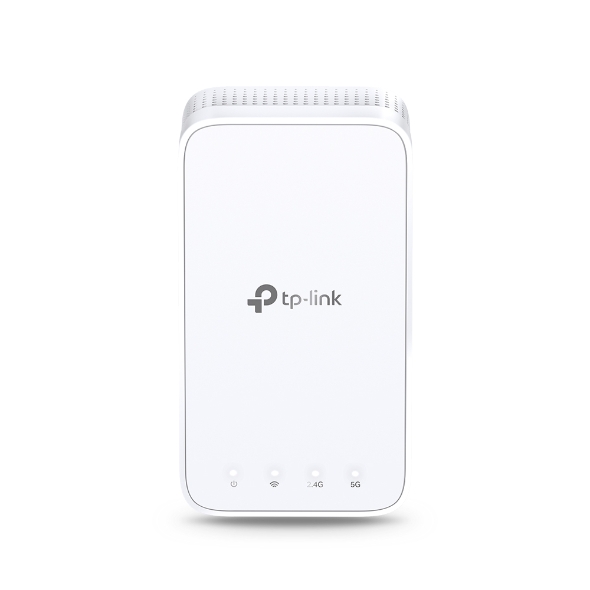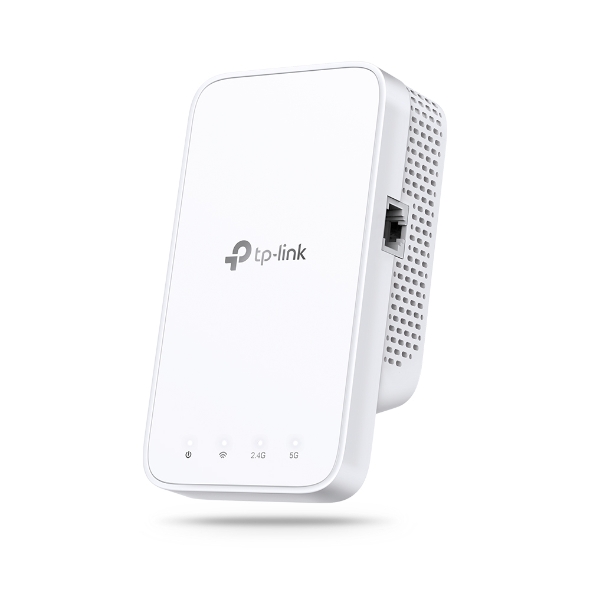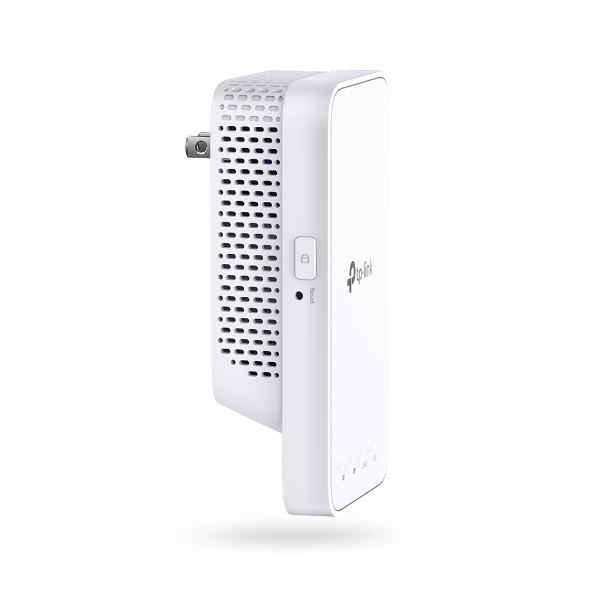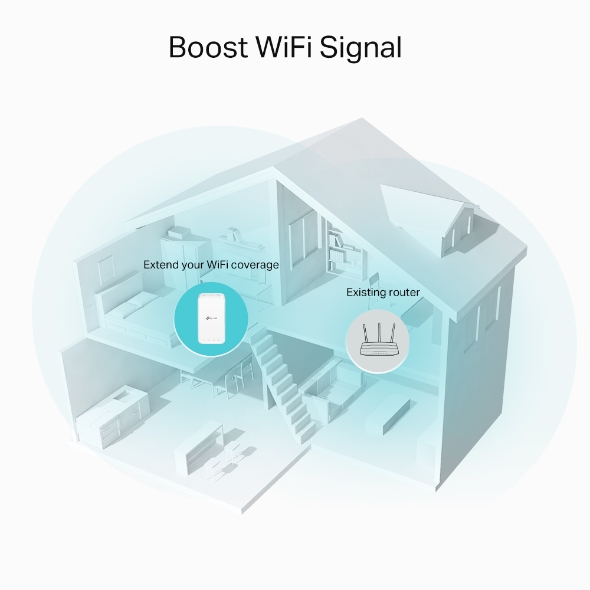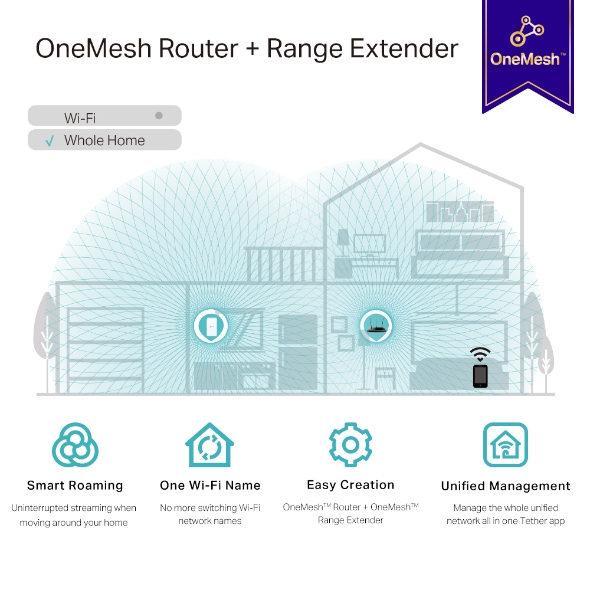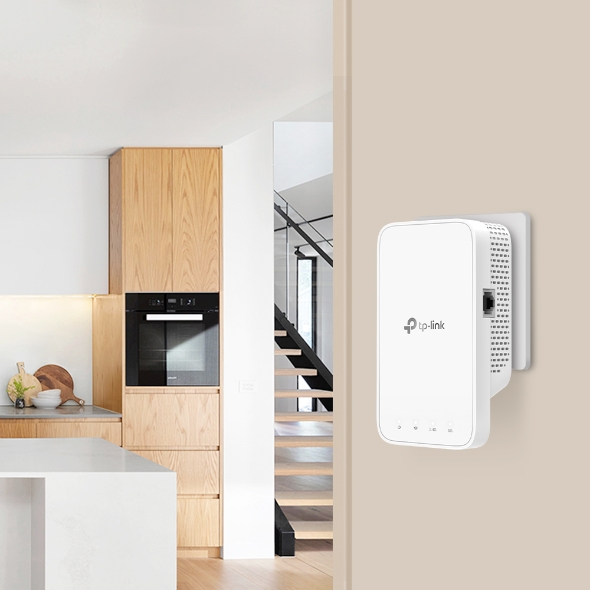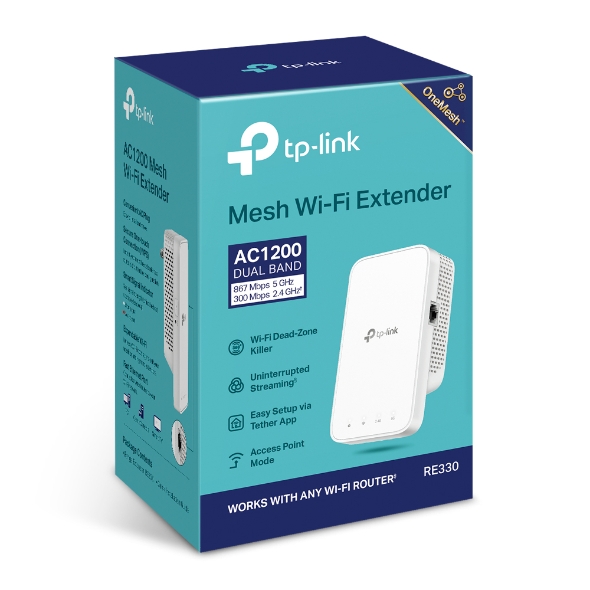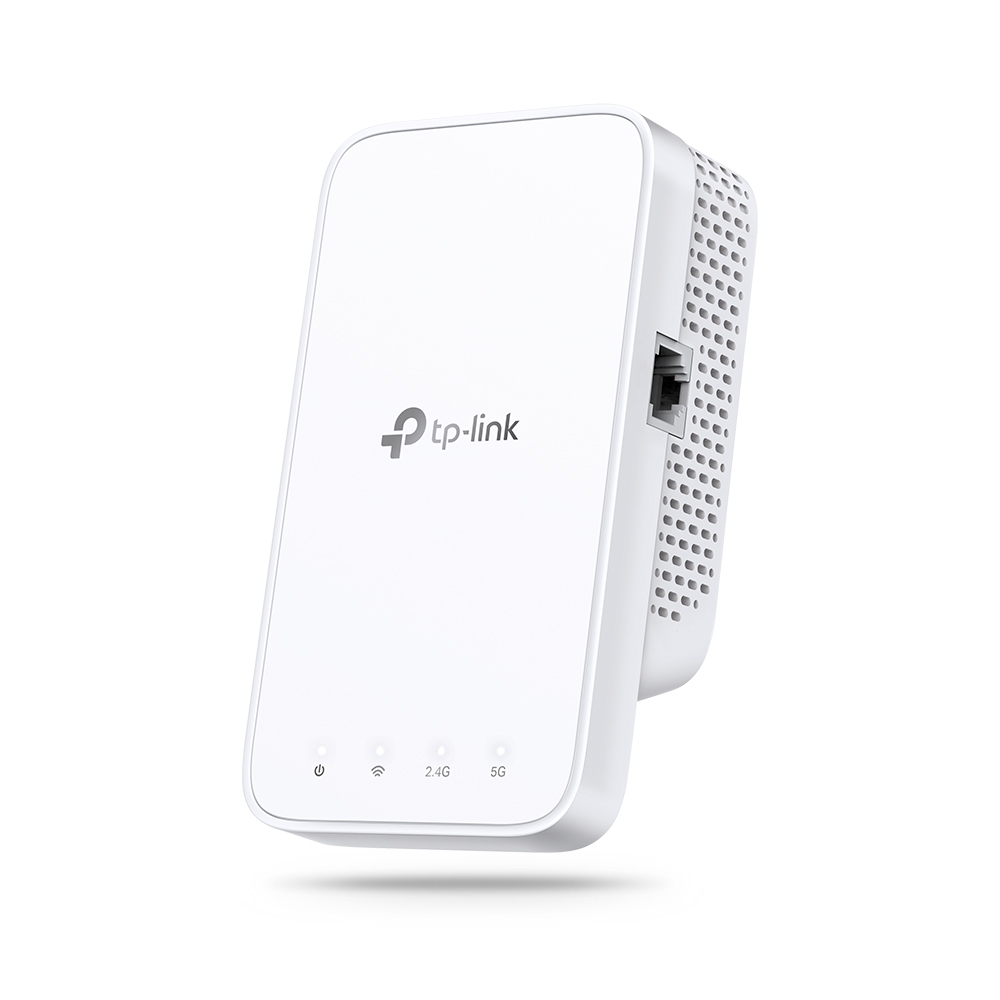RE330
NewAC1200 Mesh Wi-Fi Extender
- Eliminate weak signal areas with whole home WiFi coverage.
- 2.4 GHz (300 Mbps) and 5 GHz (867 Mbps) dual-band WiFi connection ensures more stable wireless experience.†
- Creates a Mesh network by connecting to a TP-Link OneMesh™ router for seamless whole-home coverage.‡
- Adaptive Path Selection – connects to the fastest connection path to the router automatically and runs at top-speed.
- High Speed Mode – maximizes speed by using one WiFi band as dedicated backhaul, ideal for HD streaming and gaming.
- AP Mode – create a new Wi-Fi access point to enhance your wired network with Wi-Fi capability.
- Smart signal indicator helps to find the best location for optimal Wi-Fi coverage by showing the signal strength.
- Push the WPS button to easily connect to the router and you can uniformly manage from the Tether app or Web UI.
- Works with any Wi-Fi router or wireless access point.§
Expand Your WiFi to Every Room
AC1200 Mesh WiFi Extender
RE330
Boost WiFi Signal Wherever You Need it
A single router has limited WiFi coverage and always causes WiFi dead zones. RE330 wirelessly connects to your existing router and expands its WiFi signal into areas it can’t reach on its own. Enjoy stable and high-speed AC1200 network experience wherever you’re at your home.
Extend your WiFi coverage
Existing router
Faster Dual Band WiFi Up to 1200 Mbps
The RE330 delivers dual band (2.4GHz and 5GHz) to transmit WiFi signal, doubling the performance of single band. It enables you to keep more devices connected at the same time with its 2.4GHz 300 Mbps and 5GHz 867 Mbps dual bands. Use the 2.4GHz band to send email and browse the web, and the 5GHz band for gaming and HD streaming.
867Mbps
5GHz Band

300Mbps
2.4GHz Band

TP-Link OneMesh™
OneMesh™ is a simple way to form a Mesh network with a single Wi-Fi name for seamless whole-home coverage. Just connect a OneMesh™ range extender to a OneMesh™ router. No more searching around for a stable connection.
-
Smart RoamingUninterrupted streaming when moving around your home Extender
-
One Wi-Fi NameNo more switching Wi-Fi network names
-
Easy CreationOneMesh™ Router + OneMesh™ Range Extender
-
Unified ManagementManage the whole unified network all in one Tether app
-
Traditional Router with Extender
-
OneMesh™ Router + Range Extender
Enjoy a Mesh Network with Your Existing Router
Want a Mesh network? Hesitate on whether to replace your existing router and buy a Mesh set?
TP-Link OneMesh™ resolves your dilemma.



Adaptive Path Selection: Keeps itself work at top-speed
Adaptive Path Selection keeps your network running at top-speed by automatically choosing the fastest connection path to the router. Always get your devices at fast and stable, especially ideal for network environment crowded with many devices and applications.
Without Adaptive Path Selection
Adaptive Path Selection
2.4 GHz
5 GHz
2.4 GHz
5 GHz
High Speed Mode: Maximized Speed with Dedicated Backhaul
Uses one dedicated WiFi band as backhaul and another dedicated WiFi band as an access point to maximize the bandwidth on the extended WiFi.
2.4 GHz
300 Mbps
5 GHz
867 Mbps
100%
Boosted Speed
Built-in Access Point Mode
RE330 is more than a wireless range extender. Simply plug an Ethernet cable into its Ethernet port, and easily turn your wired internet connection into a 2×2 MIMO dual band wireless access point.
Control at Your Fingertips
Set up and manage your Wi-Fi through the TP-Link Tether app from your smartphone (Android, iOS), including TP-Link routers and range extenders.
| WIRELESS | |
|---|---|
| Working Modes | Range Extender/Access Point |
| HARDWARE FEATURES | |
|---|---|
| Standards and Protocols | IEEE 802.11a/n/ac 5 GHz, IEEE 802.11b/g/n 2.4 GHz |
| Interface | 1 x 10/100M Ethernet Port (RJ45) |
| Ports | 1 x 10/100Mbps Ethernet Port (RJ45) |
| Button | WPS Button, Reset Button |
| Input Power | 100-240V~50/60Hz |
| Power Consumption | 9.5W |
| Dimensions ( W x D x H ) | 2.7×1.4×4.9 in. (69.5×35.0×124.1 mm) |
| Antenna | 2 Internal Antennas |
| WIRELESS FEATURES | |
|---|---|
| Wireless Standards | IEEE 802.11a/n/ac 5GHz, IEEE 802.11b/g/n 2.4GHz |
| Frequency | 2.4GHz & 5GHz(11ac) |
| Signal Rate | 300 Mbps at 2.4 GHz, 867 Mbps at 5 GHz |
| Working Modes | Range Extender/Access Point |
| Reception Sensitivity | 5 GHz:11a 6Mbps: -94dBm, 11a 54Mbps: -77dBm11ac HT20 MCS0: -94dBm, 11ac HT20 MCS8: -71dBm11ac HT40 MCS0: -92dBm, 11ac HT40 MCS9: -66dBm11ac HT80 MCS0: -87dBm, 11ac HT80 MCS9: -62dBm 2.4 GHz:11g 54Mbps: -78dBm, 11n HT20 MCS7: -76dBm11n HT40 MCS7: -74dBm |
| Wireless Modes | Range Extender/Access Point |
| Wireless Functions | Enable/Disable Wireless Radio, Wireless Statistics |
| Wireless Security | 64/128-bit WEP, WPA-PSK/WPA2-PSK encryptions |
| Transmission Power | 2.4 GHz ≤20dBm, 5 GHz ≤30dBm |
| OTHERS | |
|---|---|
| Certification | FCC, RoHS |
| Package Contents | Wi-Fi Range Extender RE330Quick Installation Guide |
| System Requirements | Microsoft Windows 98SE, NT, 2000, XP, Vista™ or Windows 7, 8, 8.1, 10, MAC OS, NetWare, UNIX or Linux Internet Explorer 11, Firefox 12.0, Chrome 20.0, Safari 4.0, or other Java-enabled browser |
| Environment | Operating Temperature: 0℃~40℃ (32℉ ~104℉)Storage Temperature: -40℃~70℃ (-40℉ ~158℉)Operating Humidity: 10%~90% non-condensingStorage Humidity: 5%~90% non-condensing |
† Maximum wireless signal rates are the physical rates derived from IEEE Standard 802.11 specifications. Actual wireless data throughput and wireless coverage are not guaranteed and will vary as a result of 1) environmental factors, including building materials, physical objects, and obstacles, 2) network conditions, including local interference, volume and density of traffic, product location, network complexity, and network overhead, and 3) client limitations, including rated performance, location, connection quality, and client condition.
‡ Smart Roaming is designed for devices that support the 802.11k/v standard.
§ The product may not be compatible with routers or gateways with firmware that has been altered, is based on open source programs, or is non-standard or outdated.
Actual network speed may be limited by the rate of the product's Ethernet WAN or LAN port, the rate supported by the network cable, Internet service provider factors and other environmental conditions.
